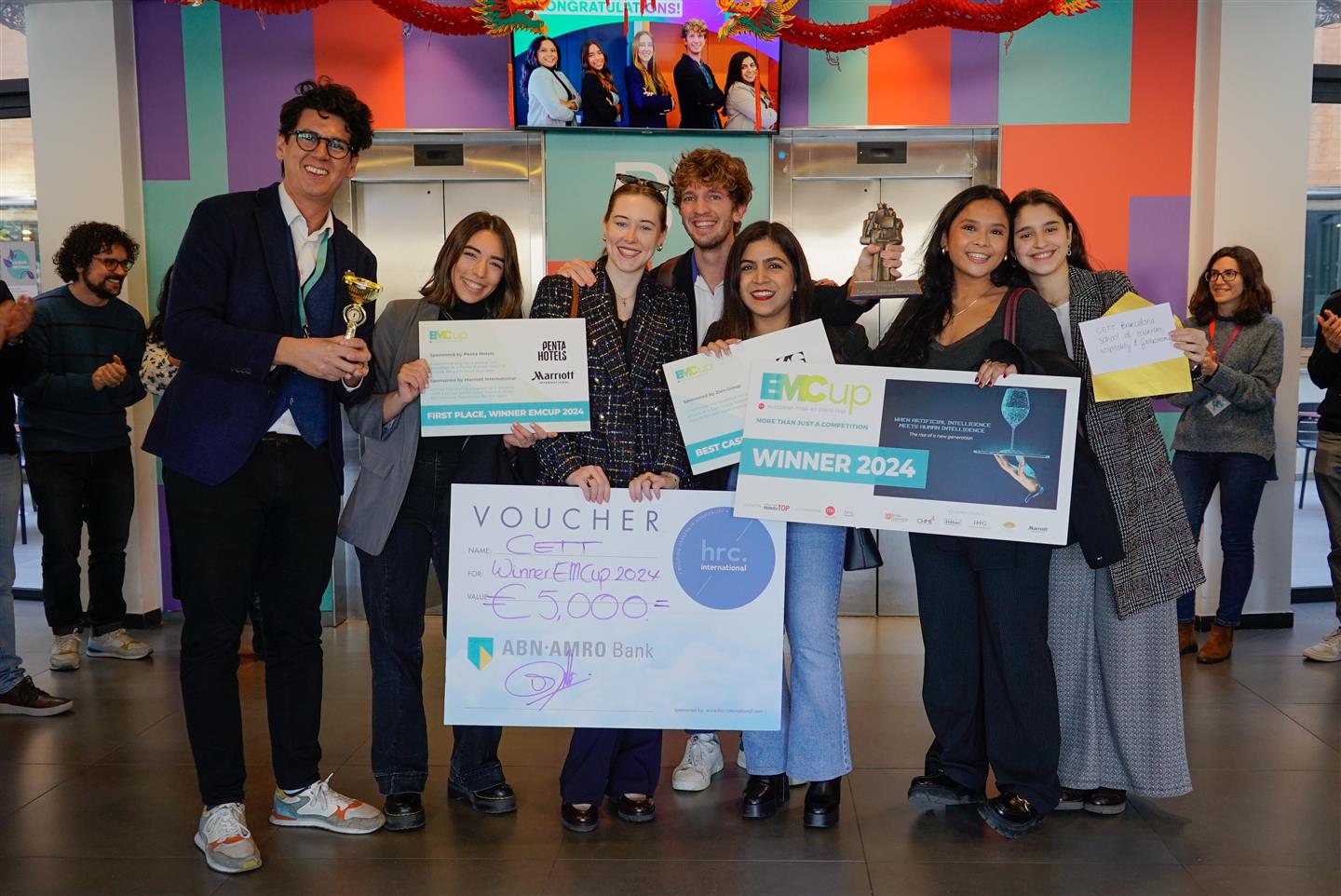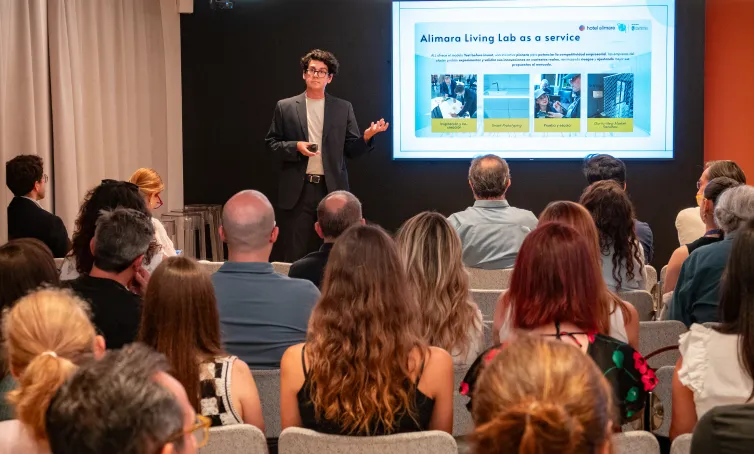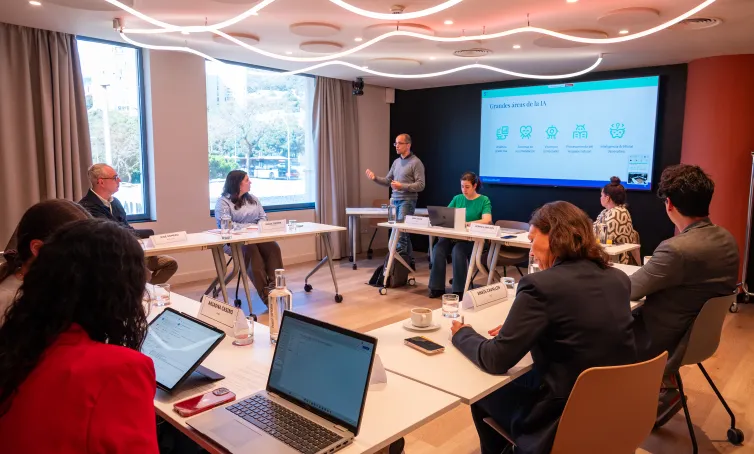"AI helps to better understand customer behavior and the service offered to them."
The Puzzlers, the team formed by students from CETT-UB, takes home the first prize at the 16th edition of the European Mise en Place Cup (EMCup).
The 16th edition of the European Mise en Place Cup (EMCup) took place on the 4th and 5th of February in Maastricht, Netherlands. This edition, focused on innovation and reflection on the convergence of artificial and human intelligence within the hospitality sector, encouraged participating students to investigate under the theme "When artificial intelligence meets human intelligence - The rise of a new generation."
The competition brought together 26 schools from around the world with the aim of highlighting how these two forms of intelligence (human and AI) can coexist and complement each other. The first prize of this edition went to the team from CETT-UB, The Puzzlers, with their innovative vision on how to merge artificial intelligence with human interaction within the hotel environment.

The team of The Puzzlers was composed of Ann-Kathrin Bley and Marina Gil Coll, second-year students in the Tourism Degree, Hanna Dimaun Adajar, a third-year student in the Tourism Degree, Tatiana Galdos Crovetto, a fourth-year student in the Tourism Degree, and Marc Plotnikov Pous, a third-year student in the Culinary and Gastronomic Sciences Degree. They were supervised by Álvaro Arrieta, director of the Master's in Hotel Management, and Helena Pérez, a fourth-year Tourism student and participant in the 2022 edition of the EMCup.
"Competitions like the EMCup are very important in the learning process of students. They allow them to understand firsthand how the industry works through close ties with many professionals in a relaxed environment. Initiatives like these build strong connections between academia and the industry, and the main beneficiaries are the professional profiles of our students," explains Álvaro Arrieta.
What was their project about? What did they present in their pitch? We took the opportunity to ask them to explain in more depth the content of the presentation that earned them the first position.
In your pitch, you mention “the missing pieces” in the hospitality industry. Which are these pieces and why? How did you arrive at this conclusion?
Marc Plotnikov: The missing pieces in the hospitality industry are Artificial Intelligence, Sustainability, and Virtual and Augmented Reality. When creating the pitch, we were required by the EMCup to talk about these three factors and how they will change the industry by 2030. That is why these are the missing pieces of Hyatt.
How can AI help to better understand the customer? And vice versa?
Anni Bley: AI can help to better understand the customer by using a concept called „Consumer behavior DNA“ that is able to find relevant patterns of the customer. This includes information such as the customer's background and their personal preferences that might have been saved in the hotel system at a previous stay. Due to this information search the hoteliers are capable of using the data and adjust not only the decision making process but moreover the marketing and revenue strategies based on the customers. Moreover, this leads to a personalized customer service that will help the hotel to gain guest loyalty and also revenue. Therefore, AI helps to better understand the behavior of the customer and thus the service offered to the customer which on the other hand helps the hoteliers to increase satisfaction and revenue.
In the pitch, you explain concepts such as liquid efficiency, sustainability and waste reduction, supply chain optimization and smart building technologies. How being sustainable can save money for the company?
Tatiana Galdos: In our pitch, we showcase how embracing sustainability isn't just about doing the right thing for the planet—it's also a smart financial move for the company. By implementing initiatives like waste reduction, supply chain optimization, and smart building technologies, we're not only reducing our environmental footprint but also cutting costs in significant ways.
Imagine this: by minimizing waste in our operations, we're not only being environmentally responsible but also saving money on disposal fees and reducing the need to purchase excess materials. Supply chain optimization allows us to streamline our processes, minimize inefficiencies, and negotiate better deals with suppliers, ultimately lowering our operational costs. And with smart building technologies, we're not only creating more comfortable and efficient spaces for our guests but also reducing energy consumption and utility bills.
So, being sustainable isn't just a moral imperative—it's a savvy business strategy that ultimately saves us money while benefiting the planet. It's a win-win situation that aligns perfectly with our commitment to both environmental stewardship and financial success.
So, the third piece is VR. How VR can help companies to increase their benefits, like you mention in the presentation?
Hanna Dimaun: The integration of these immersive technologies serves to upgrade the service and, therefore, it adds value to the overall guest experience. These technologies are known for their ability to offer educational and entertaining experiences.
A clear example is the application of augmented reality with the use of a device, children can see themselves next to their favorite Disney character. Consequently, guests are willing to pay an extra to the original service. When it comes to the application of virtual reality, companies can offer training programs for new employees or interns. It helps to save on expenses, both for material and time. In fact, there are Hilton hotels working with Quest Upon, virtual glasses, to train their staff, both from front desk and kitchen. Employees have the opportunity to practice as much as needed and the program may be adapted to each person.
In the pitch you affirm that “the combination of these three pieces (AI, sustainability and VR) can increase customer satisfaction, loyalty and, therefore, revenue”. How? What is the impact that AI has in customer satisfaction?
Marina Gil: AI has proven to be an amazing tool to acquire insights into customer behavior and predict future trends, which allows the companies to anticipate needs and offer hyper customized experiences. By doing this, the guest services offered are of ultimate quality. AI ensures that guests information is collected and used in order to personalize every detail of the stay. Therefore, guests do not have to worry about what to expect or if everything will be in order since AI has already anticipated it. This translates into more satisfaction.
If customers are happy with the experience, they find everything they need during the stay and, moreover, AI customizes their journey while exceeding their expectations, and customers become loyal. Not only this ensures a more stable market but it also allows companies to increase their ADR based on the extra value that has been added to the stays.



